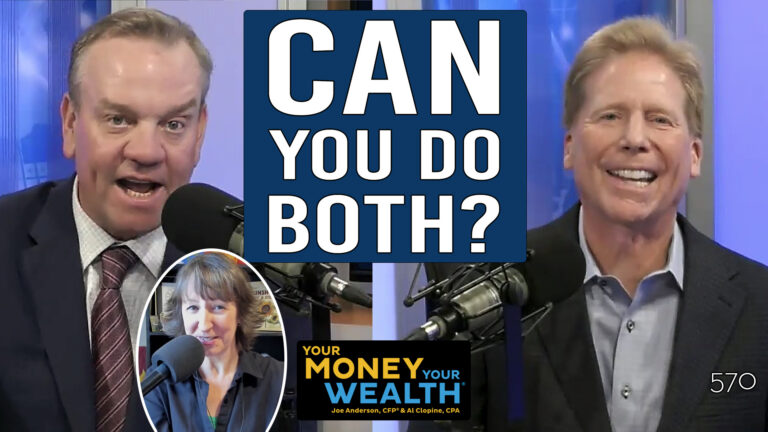How often do you come out on top if you try to beat the odds? Most active-fund managers fail to beat the market. Joe Anderson, CFP® and Big Al Clopine CPA share a more reliable way to invest for your future in YMYW podcast episode 50. Original publish date July 23, 2016 (hour 2). Note that content may be outdated as rules and regulations have changed.
10 Steps to Improve Investing Success – free download
00:00 – Intro
04:12 – “As the market declines, we are buying the same great companies at a discount, so now is the time to invest.”
06:24 – “You want to make sure you’re diversified.”
07:03 – “Small companies and value companies tend to outperform large and growth companies over the long-term. But we haven’t seen that the last few years. Does that mean we abandon that strategy? No, it still works if you give it enough time – that’s where patience is really important.”
11:01 – “We have all-time lows for the 10-year treasury…”
12:29 – “If you’re a U.S. investor and getting 60% of your portfolio going to return 6% and 40% going to return 1%, you’re talking about a 4% return which is half of the nominal return that the typical 60/40 portfolio has earned over the last 90 years. That’s a real problem for many investors who make the mistake of relying on historical returns; they’re likely to end up alive with no money.”
13:20 – “Clearly there are problems in the global economy. The credit markets are telling us a different story than the stock markets. They think that economic growth is very weak and likely to continue to be very weak. The stock market, on the other hand – at least in the U.S. where stock valuations are high – one assumes then that the market thinks growth will be somewhat reasonable.”
17:27 – “Bonds are not for return. They are to dampen the risk of the overall portfolio to an acceptable level…”
20:00 – “Whatever your political views are, I think it’s important that you hear this message. What the academic research shows is the following: when the party you favor is in power, you earn higher returns than the people in the opposing party.”
22:25 – “It’s important to not let your political biases or your political views influence your [investing] decisions.”
29:47 – “REITs (Real Estate Investment Trust), to me are the riskiest investments – or at least among them right now – as you can get a higher expected return by investing in a 10-year CD with a hell of a lot less risk.”
32:50 – “Get realistic on your budget; take a look at your bank statement… try to figure out where that money is going, what kind of retirement lifestyle you want and then start figuring out a savings plan and start early.”
Listen to the YMYW podcast:

Amazon Music
AntennaPod
Anytime Player
Apple Podcasts
Audible
Castbox
Castro
Curiocaster
Fountain
Goodpods
iHeartRadio
iVoox
Luminary
Overcast
Player FM
Pocket Casts
Podbean
Podcast Addict
Podcast Index
Podcast Guru
Podcast Republic
Podchaser
Podfriend
PodHero
podStation
Podverse
Podvine
Radio Public
Rephonic
Sonnet
Spotify
Subscribe on Android
Subscribe by Email
RSS feed

YouTube Music
IMPORTANT DISCLOSURES:
Pure Financial Advisors is a registered investment advisor. This show does not intend to provide personalized investment advice through this broadcast and does not represent that the securities or services discussed are suitable for any investor. Investors are advised not to rely on any information contained in the broadcast in the process of making a full and informed investment decision.
• Investment Advisory and Financial Planning Services are offered through Pure Financial Advisors, LLC, a Registered Investment Advisor.
• Pure Financial Advisors LLC does not offer tax or legal advice. Consult with your tax advisor or attorney regarding specific situations.
• Opinions expressed are not intended as investment advice or to predict future performance.
• Past performance does not guarantee future results.
• Investing involves risk including the potential loss of principal. No investment strategy can guarantee a profit or protect against loss in periods of declining values.
• All information is believed to be from reliable sources; however, we make no representation as to its completeness or accuracy. As rules and regulations change, content may become outdated.
• Intended for educational purposes only and are not intended as individualized advice or a guarantee that you will achieve a desired result. Before implementing any strategies discussed you should consult your tax and financial advisors.
CFP® – The CERTIFIED FINANCIAL PLANNER™ certification is by the Certified Financial Planner Board of Standards, Inc. To attain the right to use the CFP® designation, an individual must satisfactorily fulfill education, experience and ethics requirements as well as pass a comprehensive exam. Thirty hours of continuing education is required every two years to maintain the designation.
AIF® – Accredited Investment Fiduciary designation is administered by the Center for Fiduciary Studies fi360. To receive the AIF Designation, an individual must meet prerequisite criteria, complete a training program, and pass a comprehensive examination. Six hours of continuing education is required annually to maintain the designation.
CPA – Certified Public Accountant is a license set by the American Institute of Certified Public Accountants and administered by the National Association of State Boards of Accountancy. Eligibility to sit for the Uniform CPA Exam is determined by individual State Boards of Accountancy. Typically, the requirement is a U.S. bachelor’s degree which includes a minimum number of qualifying credit hours in accounting and business administration with an additional one-year study. All CPA candidates must pass the Uniform CPA Examination to qualify for a CPA certificate and license (i.e., permit to practice) to practice public accounting. CPAs are required to take continuing education courses to renew their license, and most states require CPAs to complete an ethics course during every renewal period.









